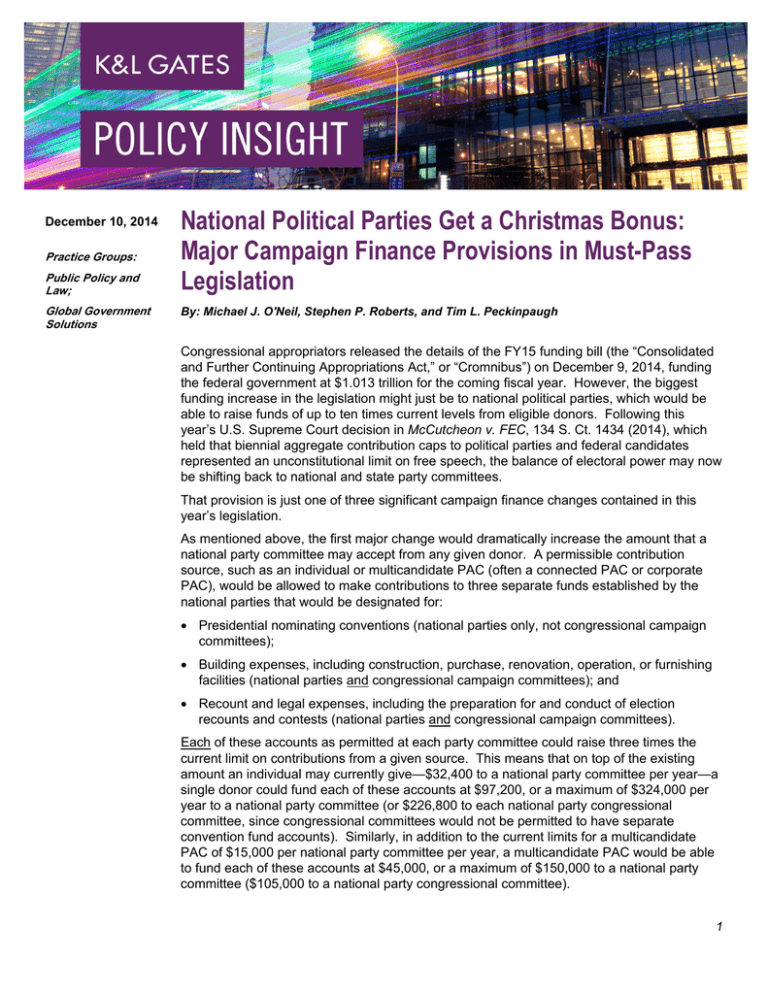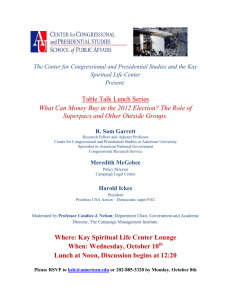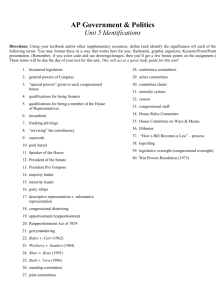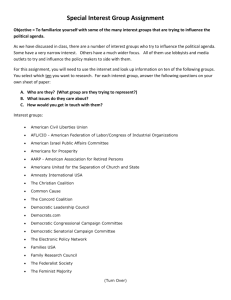
December 10, 2014
Practice Groups:
Public Policy and
Law;
Global Government
Solutions
National Political Parties Get a Christmas Bonus:
Major Campaign Finance Provisions in Must-Pass
Legislation
By: Michael J. O'Neil, Stephen P. Roberts, and Tim L. Peckinpaugh
Congressional appropriators released the details of the FY15 funding bill (the “Consolidated
and Further Continuing Appropriations Act,” or “Cromnibus”) on December 9, 2014, funding
the federal government at $1.013 trillion for the coming fiscal year. However, the biggest
funding increase in the legislation might just be to national political parties, which would be
able to raise funds of up to ten times current levels from eligible donors. Following this
year’s U.S. Supreme Court decision in McCutcheon v. FEC, 134 S. Ct. 1434 (2014), which
held that biennial aggregate contribution caps to political parties and federal candidates
represented an unconstitutional limit on free speech, the balance of electoral power may now
be shifting back to national and state party committees.
That provision is just one of three significant campaign finance changes contained in this
year’s legislation.
As mentioned above, the first major change would dramatically increase the amount that a
national party committee may accept from any given donor. A permissible contribution
source, such as an individual or multicandidate PAC (often a connected PAC or corporate
PAC), would be allowed to make contributions to three separate funds established by the
national parties that would be designated for:
• Presidential nominating conventions (national parties only, not congressional campaign
committees);
• Building expenses, including construction, purchase, renovation, operation, or furnishing
facilities (national parties and congressional campaign committees); and
• Recount and legal expenses, including the preparation for and conduct of election
recounts and contests (national parties and congressional campaign committees).
Each of these accounts as permitted at each party committee could raise three times the
current limit on contributions from a given source. This means that on top of the existing
amount an individual may currently give—$32,400 to a national party committee per year—a
single donor could fund each of these accounts at $97,200, or a maximum of $324,000 per
year to a national party committee (or $226,800 to each national party congressional
committee, since congressional committees would not be permitted to have separate
convention fund accounts). Similarly, in addition to the current limits for a multicandidate
PAC of $15,000 per national party committee per year, a multicandidate PAC would be able
to fund each of these accounts at $45,000, or a maximum of $150,000 to a national party
committee ($105,000 to a national party congressional committee).
1
National Political Parties Get a Christmas Bonus: Major Campaign Finance
Provisions in Must-Pass Legislation
Some of these secondary accounts may seem familiar—recall the “Building Funds” used as
a way to accept so-called soft money in the days prior to the Bipartisan Campaign Reform
Act, Pub. L. 107-155 (2002). But, importantly, no new funding sources are added as a result
of this language. Corporations, federal contractors, and national banks, for instance, are all
still prohibited from contributing to any of these funds.
The second major provision would prohibit any funds from being used to require (or even
recommend) that an entity submitting a bid for a federal contract disclose federal political
spending as part of that bid. The provision would prevent a potential contractor from being
pressured into disclosing details about the contributions, expenditures, independent
expenditures, or electioneering communications of the entity itself, as well as of its officers,
directors, affiliates and subsidiaries.
This provision appears to be in response to President Barack Obama’s draft executive order
from 2011 requiring such disclosures. The White House had appeared to step away from
the draft in light of significant opposition, but some reform groups had recently called on the
president to reconsider issuing the executive order. However, the provision in the
appropriations bill would not change the longstanding statute preventing an existing federal
contractor from making federal political contributions (to a candidate, party, PAC, or “SuperPAC”), nor would it roll back federal pay-to-play laws in effect at certain agencies, such as
the Securities and Exchange Commission and the Commodity Futures Trading Commission.
Finally, the appropriations bill would prohibit any funds from being used by the Executive
Office of the President to request a determination from the Department of the Treasury or the
Internal Revenue Service regarding the treatment of an organization for tax-exempt status.
This is only the latest development in the ongoing controversy regarding heightened scrutiny
that the Internal Revenue Service reportedly placed on certain organizations applying for taxexempt status. For more information on that debate, see the K&L Gates alert, “Taxes and
Politics Collide in New IRS Guidelines for 501(c)(4) Organizations,” available here.
The appropriations bill is expected to pass the House and Senate without amendment by
December 13; it would then go to the president for signature.
Authors:
Michael J. O'Neil
mike.oneil@klgates.com
+1.202.661.6226
Stephen P. Roberts
steve.roberts@klgates.com
+1.202.778.9357
Tim L. Peckinpaugh
tim.peckinpaugh@klgates.com
+1.202.661.6265
2
National Political Parties Get a Christmas Bonus: Major Campaign Finance
Provisions in Must-Pass Legislation
Anchorage Austin Beijing Berlin Boston Brisbane Brussels Charleston Charlotte Chicago Dallas Doha Dubai Fort Worth Frankfurt
Harrisburg Hong Kong Houston London Los Angeles Melbourne Miami Milan Moscow Newark New York Orange County Palo Alto Paris
Perth Pittsburgh Portland Raleigh Research Triangle Park San Francisco São Paulo Seattle Seoul Shanghai Singapore Spokane
Sydney Taipei Tokyo Warsaw Washington, D.C. Wilmington
K&L Gates comprises more than 2,000 lawyers globally who practice in fully integrated offices located on five
continents. The firm represents leading multinational corporations, growth and middle-market companies, capital
markets participants and entrepreneurs in every major industry group as well as public sector entities, educational
institutions, philanthropic organizations and individuals. For more information about K&L Gates or its locations,
practices and registrations, visit www.klgates.com.
This publication is for informational purposes and does not contain or convey legal advice. The information herein should not be used or relied upon in
regard to any particular facts or circumstances without first consulting a lawyer.
© 2014 K&L Gates LLP. All Rights Reserved.
3






